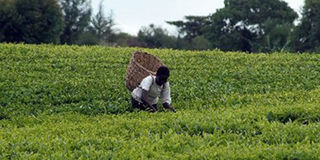Tea farmers abandon cash crop as prices plunge

A tea picker in Nandi: Falling tea prices have forced hundreds of farmers in the North Rift to switch to other crops and forestry. PHOTO | FILE
What you need to know:
- Mr Edward Mudibo, the CEO of East Africa Tea Traders Association which runs the auction said marketers were not hoarding but engaging in prudent selling.
- The agency sells a 50 kilogramme bag of fertiliser at Sh4,000 while the government’s subsidised fertiliser retails at Sh2,000.
- It is understood that multinationals have also reduced green leaf prices to below the Sh25 and Sh28 they previously offered farmers.
Falling tea prices have forced hundreds of farmers in the North Rift to switch to other crops and forestry.
Many farmers in the region are investing in eucalyptus trees which they consider to be more profitable because of increased demand for wood products as tea prices fall in the world market.
“It amounts to extra costs to continue maintaining the crop when the returns are low. It is better to diversify to better investments like farm forestry,” said Ms Leah Too, from Nandi County whose three-acre tea bushes have been left to grow wild.
Prices at the Mombasa Tea Auction Wednesday fell below $2.00 (about Sh170) per kilogramme of processed tea for the first time since 2008 as producers flooded the auction ahead of the Easter break. The weekly auction is closed next week because of the Easter holiday.
Mr Edward Mudibo, the CEO of East Africa Tea Traders Association which runs the auction said marketers were not hoarding but engaging in prudent selling.
“The main isssue is over-supply by 60 million kilogrammes,” he said.
The downward spiral has seen small scale farmers being paid as low as Sh14 per kilogramme for their produce.
The misfortunes facing the tea farmers have been complicated further by higher fertiliser prices.
The input is supplied by Kenya Tea Development Agency (KTDA) which the farmers accuse of exploitation.
The agency sells a 50 kilogramme bag of fertiliser at Sh4,000 while the government’s subsidised fertiliser retails at Sh2,000.
It is understood that warehouses owned by both KTDA and multinational firms are overflowing with unsold tea which has been hoarded since last year. This glut is a major contributor to the low prices last witnessed in 2008.
HOLDING STOCKS
KTDA says it was holding stocks lasting for 45 days at its warehouses. Multinational firms say it was normal to hoard huge stocks between February and March.
Reports indicate that the farmers’ body has at times been forced to sell its tea below the auction price, losing up to 60 US cents or Sh55 per kilo of processed tea.
“In October last year, KTDA sold tea directly to a Pakistani buyer at $2.05 (Sh170) per kilogramme, below the auction price of $2.65,” said an industry player who is privy to the goings on.
‘‘Everybody hoards (tea) but KTDA overdid it in 2013. They have been forced to release it to the market at throw-away prices,” the industry player who did not wish to be named said.
Industry players have also attributed overproduction and the resultant low prices to favourable rains from October last year in the major growing areas.
MONTHLY PAY
Already, KTDA, the marketing agency for small scale growers, has ruled out the mini bonus to farmers and said the monthly pay at the rate of Sh14 a kilo of green leaf is pegged on the behaviour at the tea auction.
“As management, we have advised the factory companies not to pay the mini bonus and reinvest the money instead,” said Alfred Njagi, the firm’s operations manager on Tuesday.
Across the globe, major tea producers have oversupplied the market with produce, resulting to an excess of 178 million kilogrammes of tea.
Reports also show that most multinational firms have adopted a wait-and-see attitude before increasing prices but Eastern Produce of Kenya Ltd has already declared a bonus that is Sh10 per kilo lower than last year.
“We are in a bad financial situation. There is a glut but we understand that some industry players read the market differently and hoarded tea.
‘‘Plus the global oversupply problem and the political instability affecting major buyers like Syria and Egypt,” said an official at the Eastern Produce of Kenya Ltd, who did not wish to be named.
“If KTDA were to declare Sh10 per kilogramme as bonus, farmers would earn Sh18.9 billion,” he said.
It is understood that multinationals have also reduced green leaf prices to below the Sh25 and Sh28 they previously offered farmers.
“We have no comment on why prices are coming down for now,” said Mr Micah Cheburet, corporate affairs director with Unilever Tea Company Ltd.
Farmers say in 2011 and 2012 when the country experienced a prolonged dry spell, KTDA plans worked very well and to the advantage of farmers but this time round the company made a mistake by not selling its tea expecting similar dry spells.
A tea expert, Mr Gideon Too, who worked in the industry for 25 years and 12 years in Ministry of Agriculture and retired as CEO of Kenya Tea Growers Association says:
“KTDA is to blame for it didn’t sell all the tea which small scale farmers produced in 2012 because the tea agency hoped it could make a killing assuming the country would experience prolonged drought just as was the case in year 2011 when drought led to uprising of price.”
He faulted the current system where brokers dominate Kenya’s export tea.
The middlemen decide the amount which should be sold in leading supermarkets and urged the government to ensure farmers are not exploited.
KTDA markets over 60 per cent of the tea produced in Kenya while plantations handle the balance.
Additional reporting by Tom Matoke





